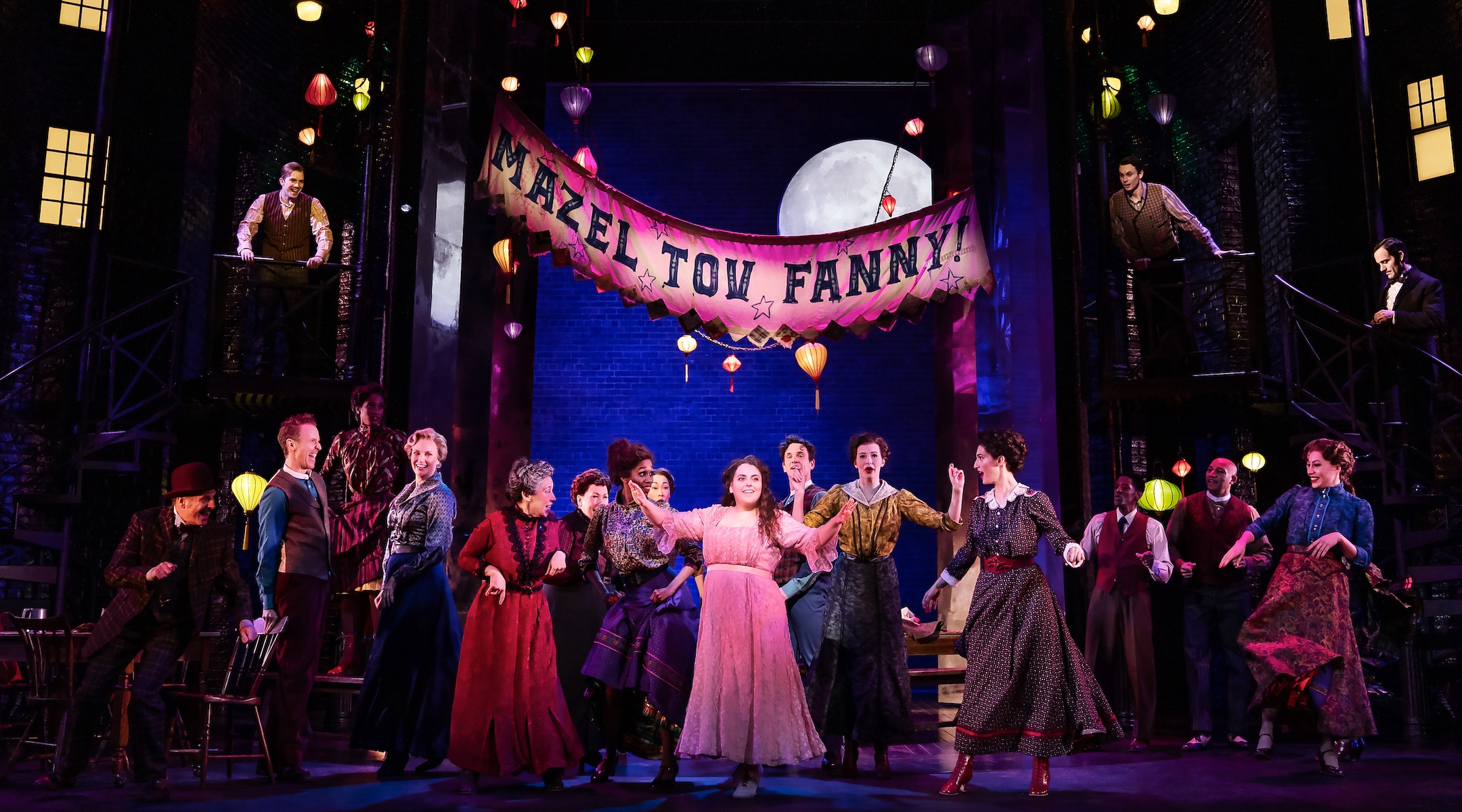‘Funny Girl’ national tour casts non-Jewish actor as Fanny Brice, reigniting ‘Jewface’ criticism
The production had advertised that it was ‘specifically seeking actors of Jewish heritage’

Signage for Broadway’s “Funny Girl,” which begins its national tour in September. (Bruce Glikas/WireImage via Getty Images)
(JTA) — The announcement this week that Katerina McCrimmon would star as Fanny Brice in the national tour of “Funny Girl,” the Broadway musical about a trailblazing Jewish comedian, has ignited criticism from some Jewish actors who say the role should be played only by someone who identifies as Jewish.
The casting, announced on Tuesday, is a breakout role for McCrimmon, who previously appeared briefly on Broadway in Tennessee Williams’ “The Rose Tattoo” but has mostly done smaller productions.
But it has disappointed some Jewish performers and their allies in the theater community who knew that the production had advertised itself as “specifically seeking actors of Jewish heritage.”
Jennifer Apple, one of the first actors to discuss the decision on social media, told the Jewish Telegraphic Agency that because Jewishness was central to Brice, a pioneering early 20th-century vaudevillian, it should be for anyone playing her as well.
“Fanny Brice was a real human being,” said Apple, who also auditioned for the role of Brice and appeared in the national tour of “The Band’s Visit,” about an Egyptian police band’s accidental stay in an Israeli town. “She was a Jewish icon. She was a heroine. She in and of herself paved the way for performers like myself to be able to have a career. If it wasn’t for her, and her chutzpah, many of us Jewish women specifically wouldn’t be able to be performers. So it’s integral to this role, specifically.”
Someone can have Jewish heritage without embracing a Jewish identity — just ask the actor Lea Michele, who replaced Jewish actor Beanie Feldstein as Brice in the recent Broadway revival of “Funny Girl.” Michele’s father is a Sephardic Jew, but she was raised as a Catholic and said she does not identify as Jewish. (For six seasons on the hit television show “Glee,” Michele played a Jewish character, Rachel Berry, who was set on one day portraying Fanny Brice.)
But none of the coverage of McCrimmon’s casting in arts outlets has suggested any personal connection to the Brice character’s Jewish identity, and in the show’s materials, she identifies as “a proud Cuban-American from Miami.” She did not respond to a request for comment.
“I have no doubt that Katerina is freaking terrific and … that she is more than capable of leading a nat’l tour,” Samantha Massell, an actor who appeared in the revival of “Fiddler on the Roof” on Broadway, posted on Instagram after the casting announcement. “But if you consider yourself an advocate for representation in casting and you’re AOK with this (or celebrating it), you need to check yourself.”
The casting adds to an ongoing debate over identity and performance. Some argue that actors should be able to play any role, regardless of their background. But the idea that at least some roles should be reserved for actors whose identities overlap with their characters’ has gained steam in recent years — opening the door for criticism when people who are not Jewish are cast as Jewish characters. (Helen Mirren, who is not Jewish but is playing the Israeli stateswoman Golda Meir in the upcoming film “Golda,” is among those who say they “adhere to both camps.”)
Some have criticized the casting of non-Jewish actors in Jewish roles as “Jewface.” The Jewish comedian Sarah Silverman, for example, lambasted the casting of Kathryn Hahn as Joan Rivers in a biopic that was ultimately scrapped; another frequent subject of criticism has been Rachel Brosnahan as the fictional Jewish comedian Midge Maisel on “The Marvelous Mrs. Maisel.”
The real-life Brice got her start in the 1910s headlining Florenz Ziegfeld’s revue, the “Ziegfeld Follies.” The 1964 musical and subsequent film “Funny Girl,” both starring Barbra Streisand, chronicle Brice’s rise to fame while she grapples with her own identity as a Jewish woman — including the shape of her nose, the cadence of her voice and the pacing of her humor.
“If there is something in the piece that when portrayed by somebody of a different identity could potentially be viewed as perpetuating a stereotype or veer into the land of cultural appropriation, you’ve made the wrong casting decision,” said Ari Axelrod, an actor and producer who organized a Broadway gathering in response to a neo-Nazi protest outside the first preview of “Parade,” the show about a 1915 antisemitic lynching, in which the main character is played by the Jewish actor Ben Platt.
Critics of the casting choice say specific lyrics and visual gags just don’t work as well when they are performed by people who do not have specific Jewish lived experiences because they are or can be offensive.
The song, “If a Girl isn’t Pretty,” for example, contains the lyric, “Is a nose with deviation such a crime against the nation?” referring to Brice’s own body image issues, which she partially resolved with one of the earliest rhinoplasties in the United States.
And in the song “Rat-Tat-Tat-Tat,” Brice’s character plays the Jewish caricature “Private Schwartz from Rockaway,” who wears a harness outfitted with two suggestively placed bagels and sings in an exaggerated Eastern European accent about how his “bagels gave a spin, oy, oy.”
“The content of this show is specifically about how she was not considered a pretty Jewish woman, that she had to change her name and change her looks to ‘fit in,’ that she had to assimilate because of her Jewish identity,” Apple said. “To have somebody not be Jewish and do that could perpetuate stereotypes.”
Axelrod and Apple both pointed to the casting of actor Bradley Cooper as American Jewish composer Leonard Bernstein in the upcoming Netflix film “Maestro” as another example of a “Jewface” gaffe. (Early stills of Cooper wearing a prosthetic nose for the role reignited the debate; Silverman is set to appear in the film.)
The casting decision for the tour follows a 15-month Broadway run for “Funny Girl.” Beginning in April 2022, Feldstein starred as Fanny Brice in the revival, bringing a childhood dream of hers to life. (Feldstein’s 3rd birthday party was “Funny Girl”-themed.)

Beanie Feldstein, center, stars as Fanny Brice in the Broadway revival of “Funny Girl.” (Matthew Murphy)
“I truly believe that any Jewish woman who wants to be funny and perform and sing owes something to Fanny Brice,” she told the New York Jewish Week last year.
But after three months, the production announced that Michele would replace Feldstein — after a one-month performance by Jewish actor Julie Benko.
Under the laws of the Equal Employment Opportunity Commission, it is illegal for a workplace to discriminate against an applicant or employee’s race, religion, sex or gender identity, national origin, age or disability. But the law allows employers to select for aspects of personal appearance if they are essential for fulfilling the requirements of the job — a leniency that opens the door to casting Black actors as Black characters, for example.
There are legal ways to stack the deck in favor of filling roles with actors of certain backgrounds, such as by encouraging people who hold specific identities to audition, or by encouraging others to choose not to.
Massell revealed in an Instagram story Thursday that when the casting directors of the musical “Double Helix,” which tells the story of the discovery of the structure of DNA, were auditioning for the other two Jewish roles (Massell plays the lead role of Rosalind Franklin), they asked people who do not identify as Jewish to “please pass” on auditioning.
“This feels like such a great actionable step for all of these types of roles that are specifically tied to an ethnic identity,” she said.
Those who are challenging the Brice casting on the national tour say there is room for actors to play characters unlike themselves. Apple — who said she has twice been one of just two Jews cast in professional productions of “Fiddler” — says it’s a “slippery slope” to argue that actors must only play their own identity.
“I don’t like that. I don’t subscribe to that. That’s not why I’m an actor,” she said. “It really just comes down to the integrity of the role and the story. And this one is literally about her Jewish identity. She was a Jewish icon.”
Who made the decision to depart from the character breakdown suggestion is not clear. Sonia Friedman Productions and NETworks Presentations, which are producing the tour that is set to launch in Providence, Rhode Island, this fall, did not respond to requests for comment..
“I do know that for this to have happened, a lot of people had to say yes,” said Axelrod.
He said that even though he disagrees with the casting decision, he believes it could have positive dividends for storytelling about Jews.
“Katerina has an incredible opportunity to use this moment to educate herself and empathize with Fanny’s story, but also the story of Jews today,” he said. “If we can’t change the casting decision — and I don’t necessarily think we should, it’s not up to me — we can leverage the moment as an opportunity for empathy and education.”
This article originally appeared on JTA.org.













